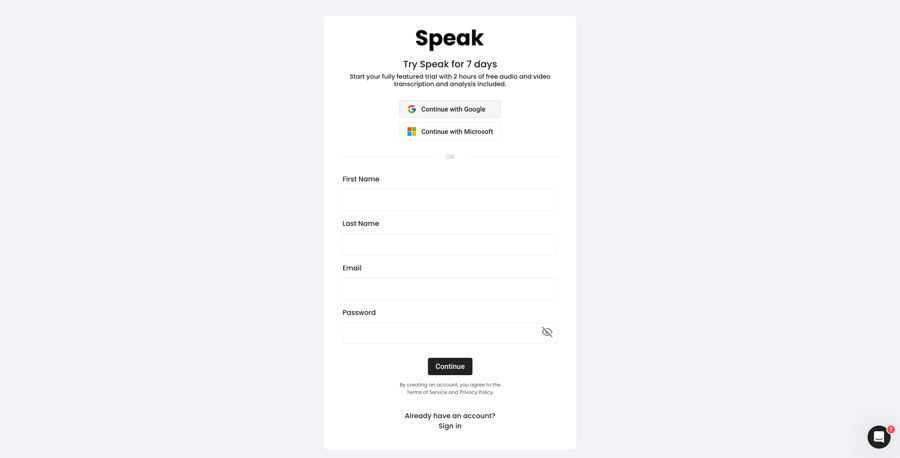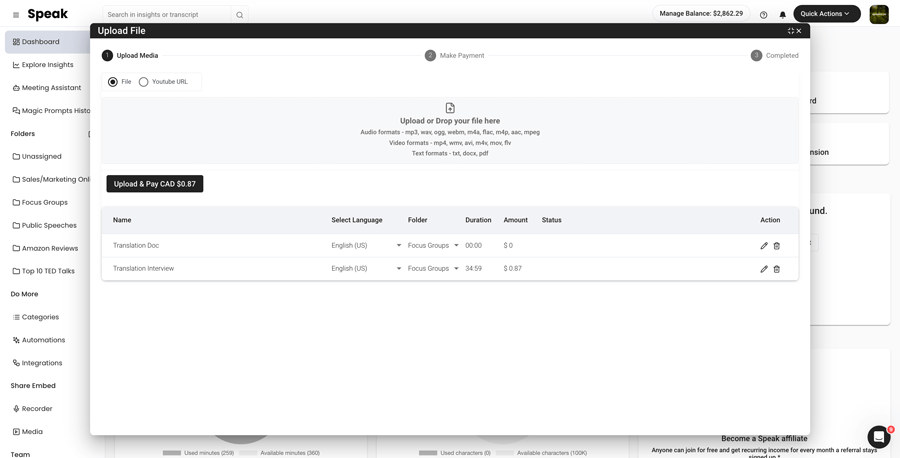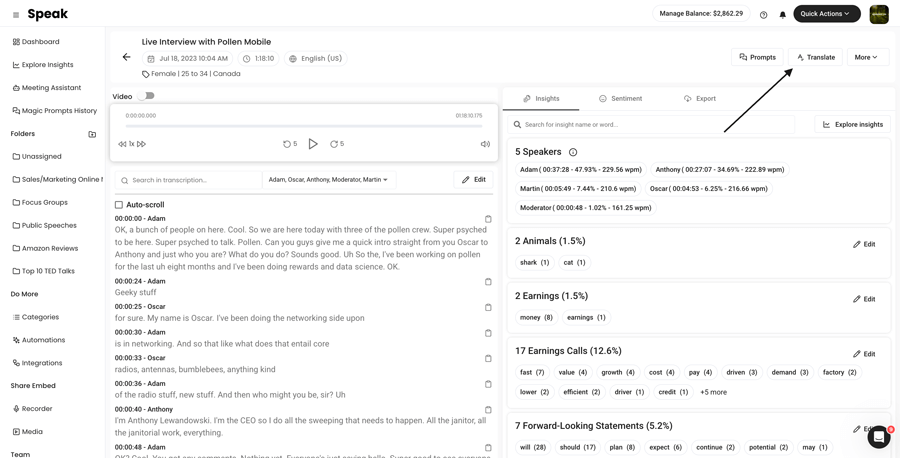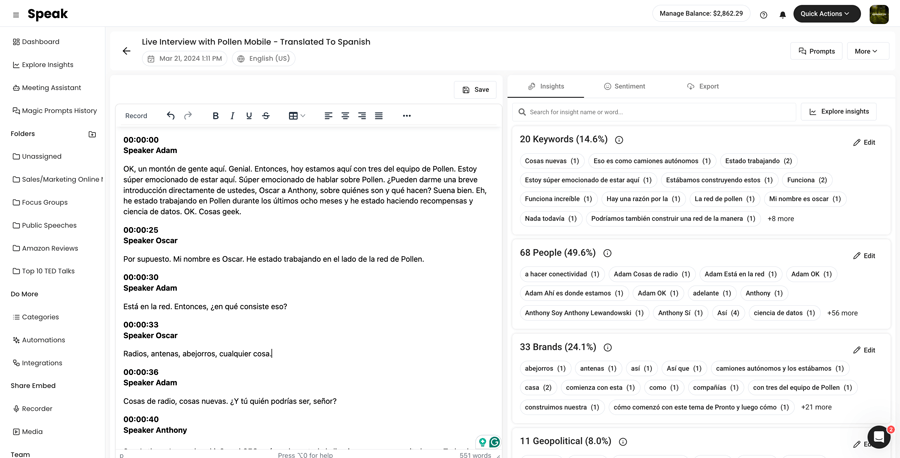How To Translate Japanese to Korean
Translating Japanese to Korean is super simple!

Step 1: Register for Speak
Register for Speak using this link.
Once you register, you can instantly begin translating your Japanese to Korean file(s).

Step 2: Upload Your Japanese file(s)
As soon as you log in, you will be redirected to the dashboard.
Once there, you can select the Quick Action "New Upload".
In Speak, you can seamlessly upload, transcribe and translate audio, video and text files all at once!

Step 3: Translate Your Japanese file(s) to Korean
Once the file is uploaded, simply visit your file and select "Translate".
If it is an audio and video file, Speak will ask you if you want to keep the speaker names and timestamps in the translation.
Want to translate many files at once? No problem!
You can view the files you want to automatically translate from Japanese to Korean from the folder level and instantly translate as many files as you need with our artificial intelligence translation in just a few clicks.

Step 4: That's It! View, Analyze, Modify & Export Your New Korean file(s)
Once the translation is done, you will be alerted and you will see a new document in the same folder your original file is in.
The file will be named the same but with a dash indicating that it is the translated version.
Need support with your Japanese translation?
We are always here and happy to help at Speak!
Just send us a message on live chat on the bottom right corner and we will ensure you are set up for success.
Interested in translating Japanese or other languages to different languages? View our entire list of supported translation languages here.
Automatic, accurate, instant AI translation from Japanese to Korean is here for you.
Register for Speak using this link and begin translating Japanese to Korean today.
Mastering Communication: The Power of Translating Japanese to Korean
In our interconnected world, language barriers can be a significant obstacle to both personal and professional growth. This is where the power of ai translation, particularly from Japanese to Korean, becomes a critical tool for overcoming these hurdles. Speak Ai, leveraging cutting-edge NLP, large language models, and AI technology, is at the forefront of enabling seamless communication between these two vibrant cultures. Let's delve into the remarkable benefits and diverse applications of automatic translation from Japanese to Korean, especially for researchers and businesses aiming for global outreach.
The Strategic Importance of Japanese to Korean Translation
With over 150K users and a sterling 4.9 rating on G2, Speak Ai's platform exemplifies how automatic translation can revolutionize interactions and operations in a multitude of sectors. The ability to instantly translate audio, video, and text from Japanese to Korean not only breaks down language barriers but also serves as a bridge connecting two rich cultures.
Business Expansion and Collaboration
For businesses eyeing expansion in East Asia, understanding and communicating in the local language is pivotal. Japanese to Korean translation allows corporations to navigate the regulatory, marketing, and operational landscapes more effectively, ensuring messages resonate with the target audience.
Academic and Research Connectivity
Researchers can disseminate their findings more broadly, fostering collaboration and innovation across borders. Automatically translated documents, research papers, and presentations maintain the integrity of original findings while making them accessible to a wider audience.
Cultural Exchange and Tourism
For tourists and enthusiasts keen on exploring the depths of Japanese and Korean cultures, automatic translation tools offer an invaluable resource, providing instant access to local knowledge, customs, and language nuances.
Saving Time and Reducing Costs with AI Translation
The evolution of AI-powered translation engines, such as those developed by Speak Ai, has dramatically reduced the time and expense associated with traditional translation methods. Large language models and AI technologies have made it possible to translate vast amounts of content accurately and within seconds, a game-changer for businesses and researchers alike.
Efficiency in Operations
Automatic translation streamlines work processes, enabling teams to focus on their core tasks rather than being bogged down by language barriers. This efficiency gain contributes to quicker decision-making and accelerates project timelines.
Cost-Effective Communication
Employing human translators for every document or piece of communication is not economically viable for many organizations. AI translation offers a cost-effective alternative, with the agility to adapt to different dialects and industry-specific terminologies.
Enhanced Accuracy and Reliability
Speak Ai's sophisticated algorithms ensure a high level of accuracy in translations, minimizing misunderstandings and potential errors that could arise from manual translation processes.
Where Japanese and Korean Thrive: A Global Perspective
Japanese and Korean are languages steeped in history and tradition, each with its own unique script, linguistic structure, and cultural nuances. Beyond their native lands of Japan and South Korea, these languages have a significant presence in regions with extensive diasporas, including the United States, Brazil, and parts of Southeast Asia.
Interesting Stats on Japanese and Korean Popularity
Japan and South Korea have made substantial cultural impacts worldwide, contributing to the global spread of their languages. With millions of people globally learning Japanese and Korean, interest in these languages has seen a remarkable upsurge, fueled by the export of culture, technology, and innovation.
Exploring the Linguistic Landscape: Japanese and Korean
Fun Facts About Japanese and Korean
Did you know that both Japanese and Korean are considered some of the most challenging languages for English speakers to learn? Despite this, the allure of K-pop, anime, and technology has driven a surge in learners seeking to master these languages. Additionally, both languages employ honorifics, reflecting the cultures' deep respect for hierarchy and social status.
Unraveling the Differences and Similarities
While Japanese and Korean might seem worlds apart at first glance, they share several linguistic and cultural similarities. For instance, both languages have complex honorific systems and value indirect forms of communication. However, they differ significantly in their writing systems and grammar. Korean uses the Hangul script, noted for its scientific design and ease of learning, whereas Japanese combines three scripts: Kanji, Hiragana, and Katakana.
Conclusion: Embracing the Future with Japanese to Korean Translation
As Speak Ai continues to pioneer advancements in ai translation, the potential to foster connectivity, understanding, and growth between Japanese and Korean speakers is boundless. Whether for business ventures, academic research, or cultural exploration, the ability to seamlessly translate between these two languages promises to open up new horizons of opportunity. Embrace the future of communication with Speak Ai, and transform how we connect across languages and cultures.
FAQs
What locations are Japanese and Korean popular?
Japanese and Korean languages are predominantly spoken in Japan and South Korea, respectively. However, significant communities of speakers can be found in the United States, Canada, Brazil, and parts of China and the Philippines, highlighting the global appeal of these languages.
What are some fun facts about Japanese and Korean?
Both languages use terms of respect to address others, depending on their social status and relationship. Additionally, South Korea's thriving music industry and Japan's anime culture have propelled these languages onto the global stage, captivating audiences worldwide.
What are the differences and similarities between Japanese and Korean?
Despite differences in script and grammar, Japanese and Korean share notable similarities, such as the use of honorifics and a preference for indirect communication. These linguistic features reflect the deep-seated cultural values common to both societies.
Translate Japanese To These Other Supported Languages:
- Translate Japanese-to-Arabic (Egypt)
- Translate Japanese-to-Arabic (Iraq)
- Translate Japanese-to-Arabic (Israel)
- Translate Japanese-to-Arabic (Jordan)
- Translate Japanese-to-Arabic (Kuwait)
- Translate Japanese-to-Arabic (Lebanon)
- Translate Japanese-to-Arabic (Oman)
- Translate Japanese-to-Arabic (Palestinian Authority)
- Translate Japanese-to-Arabic (Qatar)
- Translate Japanese-to-Arabic (Saudi Arabia)
- Translate Japanese-to-Arabic (Syrian Arab Republic)
- Translate Japanese-to-Arabic (United Arab Emirates)
- Translate Japanese-to-Arabic Modern Standard (Bahrain)
- Translate Japanese-to-Armenian
- Translate Japanese-to-Bulgarian
- Translate Japanese-to-Catalan
- Translate Japanese-to-Chinese (Cantonese, Traditional)
- Translate Japanese-to-Chinese (Simplified)
- Translate Japanese-to-Chinese (Traditional)
- Translate Japanese-to-Croatian
- Translate Japanese-to-Czech
- Translate Japanese-to-Danish
- Translate Japanese-to-Dutch
- Translate Japanese-to-English
- Translate Japanese-to-English (Australia)
- Translate Japanese-to-English (India)
- Translate Japanese-to-English (Ireland)
- Translate Japanese-to-English (New Zealand)
- Translate Japanese-to-English (Scottish)
- Translate Japanese-to-English (South African)
- Translate Japanese-to-English (United Kingdom)
- Translate Japanese-to-English (United States)
- Translate Japanese-to-Estonian
- Translate Japanese-to-Farsi
- Translate Japanese-to-Finnish
- Translate Japanese-to-French
- Translate Japanese-to-French (Canada)
- Translate Japanese-to-German
- Translate Japanese-to-German (Swiss)
- Translate Japanese-to-Greek
- Translate Japanese-to-Gujarati
- Translate Japanese-to-Hebrew
- Translate Japanese-to-Hindi
- Translate Japanese-to-Hungarian
- Translate Japanese-to-Icelandic
- Translate Japanese-to-Indonesian
- Translate Japanese-to-Irish
- Translate Japanese-to-Italian
- Translate Japanese-to-Japanese
- Translate Japanese-to-Kannada
- Translate Japanese-to-Korean
- Translate Japanese-to-Latvian
- Translate Japanese-to-Lithuanian
- Translate Japanese-to-Malay
- Translate Japanese-to-Malayalam
- Translate Japanese-to-Norwegian
- Translate Japanese-to-Persian
- Translate Japanese-to-Polish
- Translate Japanese-to-Portuguese
- Translate Japanese-to-Portuguese (Brazilian)
- Translate Japanese-to-Portuguese (Portugal)
- Translate Japanese-to-Romanian
- Translate Japanese-to-Russian
- Translate Japanese-to-Slovak
- Translate Japanese-to-Slovenian
- Translate Japanese-to-Spanish
- Translate Japanese-to-Spanish (Mexico)
- Translate Japanese-to-Swedish
- Translate Japanese-to-Tamil
- Translate Japanese-to-Telugu
- Translate Japanese-to-Thai
- Translate Japanese-to-Turkish
- Translate Japanese-to-Ukrainian
- Translate Japanese-to-Vietnamese



